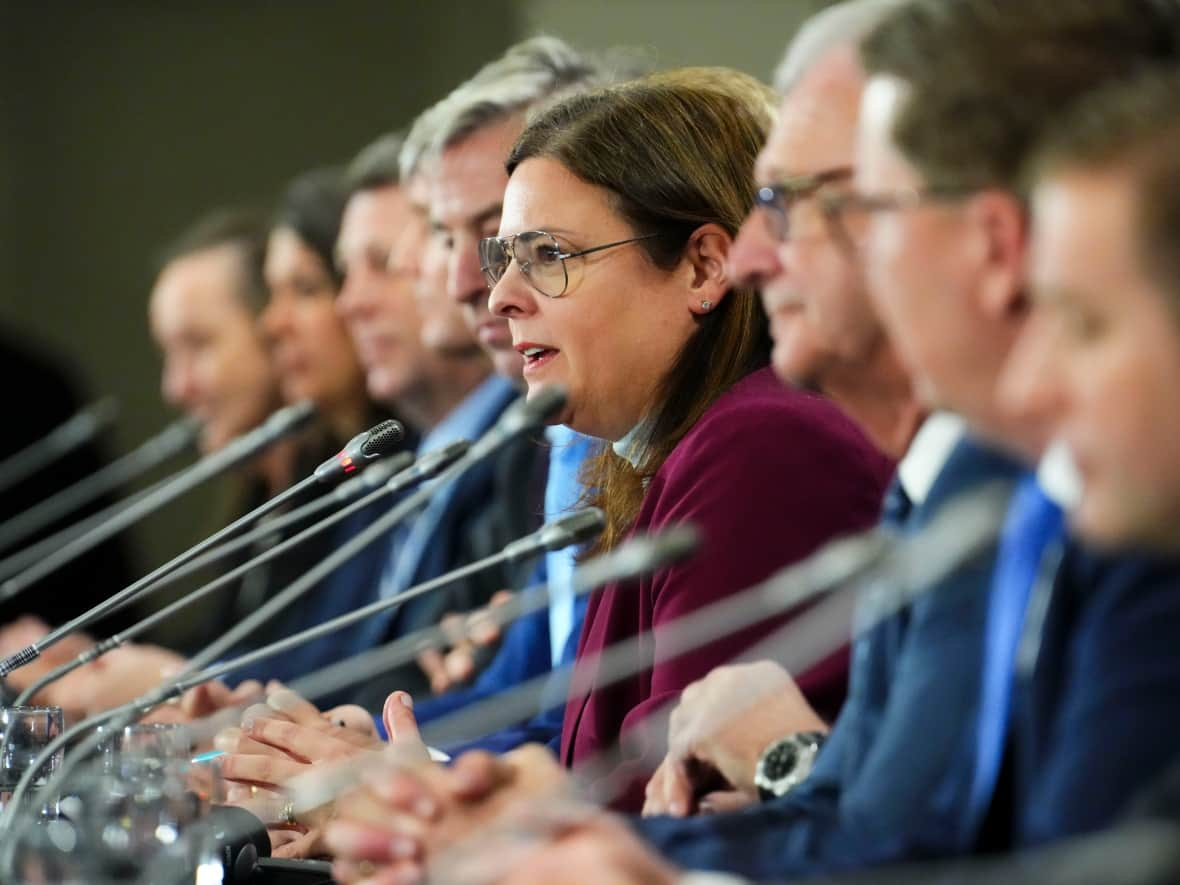Premiers accept federal health-care funding proposal

Canada's premiers have accepted Ottawa's proposal to inject billions of dollars into provincial health-care systems.
Prime Minister Justin Trudeau met with Canada's premiers last week to pitch a plan to send roughly $46.2 billion in new money to the provinces and territories over 10 years to help prop up a faltering health-care system.
Premiers met Monday to discuss the proposal. Ottawa will now hold bilateral meetings with individual provinces to finalize funding agreements.
Manitoba Premier Heather Stefanson — the current head of the Council of the Federation, the group that represents the premiers — told CBC News Network's Power & Politics that the premiers were "united" in their decision to accept Ottawa's proposal.
But Stefanson cautioned that the cash injection is not a long-term fix.
"We've accepted this for now," she told guest host David Cochrane. "But we do recognize that this is not a long-term solution to the health-care funding that is needed within our country."
WATCH | Premiers accept federal health proposal
Federal Health Minister Jean-Yves Duclos and Intergovernmental Affairs Minister Dominic LeBlanc welcomed the premiers' decision.
"Canadians have long been proud of our public and universal health-care system. We have an opportunity to continue our collaboration and improve the experience of those working in it, and those they care for," they said in a joint statement.
Ottawa's proposal includes a top-up to the Canada Health Transfer (CHT) and new money directed at four priority areas: family health services, health workers and backlogs, mental health and substance use and a "modernized health system."
To access the enhanced CHT, provinces must first commit to improving how health data is "collected, shared, used and reported to Canadians to promote greater transparency on results, and to help manage public health emergencies," the government said in a background document supplied to reporters.
The funding for the shared priorities will also be contingent on the provinces and territories developing "action plans" detailing how these funds will be spent and how progress will be measured.

Ottawa's proposal includes a five per cent annual hike to the CHT for the next five years. The CHT escalator will revert to a three per cent increase each year after that.
That falls well short of what the premiers had been requesting: an annual $28 billion increase to the CHT.
During a press conference last week, Trudeau was asked multiple times if he would be willing to offer more money or if this proposal was his final offer.
"This is the offer we put forward on the table," he said. "This is the billions of dollars that are there for provinces and we certainly look forward to working with them to be able to deliver not just that money, but those health-care improvements to citizens across the country."
WATCH | N.S. Premier says it's time to move on with health funding agreement
Nova Scotia Premier Tim Houston said he doesn't think Ottawa will offer anything further and it's time to move forward with the agreement.
"We know the reality. The money that's there is there, so no point in dragging the feet. We're just interested in moving forward," Houston said in a separate interview on Power & Politics.
Stefanson said she's concerned about the timeframe and pointed out that there's no guarantee the funding will continue to flow after 10 years. Houston suggested the timeframe would be addressed further down the line.
"We don't want to see that drop-off and I'm sure the federal government doesn't want to see that either," Houston said. "When the time comes, we'll have to address that."
Ontario Premier Doug Ford suggested to his colleagues at the Monday meeting that they ask Trudeau to extend those deals beyond the 10 years.
In a statement, his office said the recommendations would allow for sustainable funding that is "data-driven based on performance." Ford met with Duclos and LeBlanc last week and the statement from his office Monday said he was "confident" Ottawa would accept his proposal.
Ottawa preparing for spring budget
Ottawa intends to sign one-on-one agreements with every province and territory to tailor the deal to their unique needs. Duclos and LeBlanc have met already with officials from the Ontario, Nova Scotia and Newfoundland and Labrador governments to start working toward those agreements.
LeBlanc said they will be in British Columbia on Tuesday, followed by stops in the territories and the Prairies before the end of the week.
The federal Liberals want the broad strokes of the agreements in place before the next budget, which is expected sometime in March or early April.


